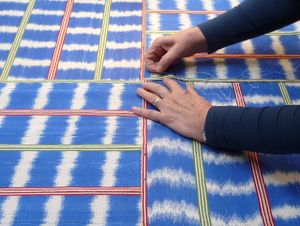This week Hampshire Cultural Trust and Winchester Poetry Festival announced the new Hampshire Poet, Nazneen Ahmed Pathak. After a countywide search, Nazneen was selected from a very strong field of writers from all over Hampshire who applied for the sought-after post.
The appointment of the Hampshire Poet takes place every two years and is led by Hampshire Cultural Trust and Winchester Poetry Festival. The partnership between the two organisations brings a higher profile and more opportunities for the role, which has been held by Kathryn Bevis since January 2020.
Today we hear from Madeleine O’Beirne about her experience taking part in the Poetry for Wellbeing sessions, led by Hampshire Poet 2020, Kathryn Bevis.
When I attended my first Poetry for Wellbeing session I hadn’t written poetry since I was at school, but I immediately found that Kathryn Bevis’ approach of presenting a poem, asking a series of questions that prompted the group to think about sensual memories, and then getting us to write our own poem in response, stirred something in me that I couldn’t stop thinking about. It was magical and also healing. Beautiful, happy memories resurfaced and warmed me. More difficult, painful memories were somehow softened, given a way to settle; it felt empowering to acknowledge them, voice them and then confine them to that poetic structure.
Poetry can reflect profoundly, and yet accessibly, upon a multitude of truths and life experiences. Think of folk songs and ballads that are passed on through generations. So many feelings and experiences are universal, but we all have our own ways of reflecting upon and expressing them. Conveying our experiences and our struggles in a creative way can relieve us of the intense burden of them. It can at the same time enable us to share with others, and so open up conversations and connections.
Using the senses to describe how we feel can be surprising, exciting and enriching. The sense of smell, for example, can be wonderfully evocative and a powerful route into memory. The smell of a certain tea always takes me back to my grandmother’s house and evokes childhood teatimes around her table. Thinking of an emotion as an animal can open up all sorts of expressive possibilities. We might even imagine an emotion as a vegetable, or a fruit – we have so many resources available to us if we allow ourselves to be imaginative and curious.
Each Poetry for Wellbeing session begins with reading a published poem aloud. Kathryn will usually read, or perhaps invite one of us to do so. The poem will address a common theme and there will always be a deeper emotional interpretation available to us beneath the surface meaning. We will then spend a few minutes by ourselves, sitting with and contemplating the poem, after which Kathryn will invite discussion about its subject, imagery and style. This is a great exercise for communicating ideas and stimulating the poetic imagination.
To start the writing process, Kathryn will pose a series of questions for us to consider. There will be things for us to list, things for us to imagine, things for us to explore, and from these we will make what she calls ‘messy notes and bullet points’. After this, we’ll spend just fifteen minutes creating a poem drawn from our notes. I do sometimes find this difficult and yet I also find it extraordinary that, even in such a short time, there is always something, however rough, written on my page, something for me to keep and work on if I want to. Here is where the magic lies.
In these sessions people are open to reading their poems and to sharing their thoughts. Kathryn is a warm, intuitive and supportive facilitator and the sessions always feel safe and non-judgemental. We are guided and encouraged, each of us left to respond in whatever way feels comfortable for us.
I have attended two Poetry for Wellbeing courses and I am now enjoying the new series of sessions, Responding to the Natural World, also part of the programme, in which we are writing poems inspired by landscape. Again, we are reading poems as our starting point (I have particularly enjoyed Mary Oliver’s ‘The Journey’ and Derek Walcott’s ‘Earth’), but we are also watching video footage of locations in the South Downs, the landscapes and seascapes providing us with sights and sounds that we can use to follow similar sense-focused leads. It is fascinating to observe the diverse responses, images and emotions that can be drawn from the same source material.
The Poetry for Wellbeing sessions provide a defined space in which to think creatively, and that is valuable in itself, just as an art or music workshop would be. Poetry can definitely promote wellbeing. Writing, or indeed reading poetry can provide a way of healing the past and of making the present more manageable. It can lift us out of the rawness and help us to be mindful. Focusing on something small, something other, something that allows distance from a problem, while at the same time elucidating it, can take us out of ourselves, heighten our ability to express what it is that we are feeling and give us much-needed perspective.
I enjoy the moment of focusing on a poem, image or narrative that evokes emotion. I enjoy learning to perceive things differently, and getting my ideas and observations down on the page through freewriting – shaping them, sharing them, hearing how others react to them. There is excitement in having written something that sparks the ‘I know that feeling!’ response in someone else; poetry can promote empathy, too.
When we write in these sessions, Kathryn encourages us to ‘show not tell’, not to write overtly about our feelings but rather to let the images we create, and the way we present them, allow the reader in. We don’t have to say ‘I’m hurt’, or ‘I’m anxious’, ‘I’m sad’, or even ‘I’m happy’ out loud, because the imagery in our poems can say it for us. It can help us to process our feelings, understand them and move on and when we listen to, or read, someone else’s poem, we can stop, take the time to let it reveal what it’s saying to us, let it allow us to feel. Listening to other people’s poems helps us to understand what it feels like to be them and that helps us to care. I love this about the sessions.
I believe that learning, experimenting and creating can build self-confidence, whatever it is that we are creating with, be it words, art, music, dance – anything that enables us to express how we feel and what we want to say, anything that helps us to build relationships and a deeper understanding of the world. I have begun to write poetry more often now and that is a thrilling learning experience for me, but it’s equally rewarding following other people’s creative journeys, listening to their words and seeing them grow in confidence week by week.
For more information about Poetry for Wellbeing please take a look at the video below.




